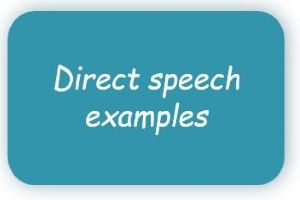Direct speech examples:
There are many different ways to incorporate direct speech into writing.
For example, a character could be speaking to another character, or the narrator could be recounting something that was said.
direct speech is used to give the reader insight into Holden’s character. In everyday life, people use direct speech to express their own thoughts and feelings.
- “I’m going to the store,” said John.
- “What time will you be home?” asked Jane.
- “I’ll be home around 6:00 pm,” said John.
The Narrator: John said he was going to the store and asked Jane what time she would be home. Jane said she would be home around six.
In this lesson will learn:
- The rules for writing a direct speech.
- The correct punctuation.
The reporting clause before the direct speech.
- He said, “Let’s go to the cinema.”
↑
Reporting clause
if the reporting speech is before the direct speech, we write a comma (,) before the direct speech.
- We write the same words inside the inverted commas. The first letter is the capital of direct speech.
- We write down a full stop (.) prior to the closing inverted commas.
Reporting clause before a question/exclamation.
- He asked, “Do you want to go to the auditorium?”
- He shouted, “Hurry up!”
If the reporting clause is before a question/exclamation:
- We write down a comma (,) before the direct speech.
- we write the same words inside the inverted commas.
- The first letter is a capital letter.
- we write the question mark (?) before the closing inverted commas.
- Put the exclamation mark (!) before the closing inverted commas.
Reporting clause after the direct speech:
- “Let’s go to the theater,” he said.
If the reporting clause is prior to the direct speech:
- We write down the same words inside the inverted commas.
- The first letter is a capital letter.
- We write down a comma (,) prior to the closing inverted commas.
- We write down the full stop (.) at end of the reporting clause.
Reporting clause after a question/exclamation:
- “Do you want to go theater?” he asked.
- “Hurry up!” he shouted.
If the reporting clause is after a question/exclamation.
- We write down the same words inside the inverted commas.
- The first letter is a capital letter.
- We write down a question mark (?) prior to the closing inverted commas.
- An exclamation mark (!) prior to the closing inverted commas.
Advance rules for direct speech.
Occasionally we break up the direct speech into two parts.
- “If you want to go the theater,” she said, “then call me.”
↑ ↑
reporting clause/ small letter
The 2nd part of the direct speech begins with a small letter if it is the same sentence as the part of the direct speech.
- “I’m tired,” she said, “Let’s stay at home.”
↑ ↑
reporting clause/ capital letter
The 2nd part of the speech starts with a capital letter if it starts with a new sentence.
Other reporting verbs:
Some other useful reporting verbs.
they are often used for writing direct speeches in books, newspapers,s and reports is more common to use them in reporting clauses after the direct speech.
- Reply (replied)
- ask (asked)
- comments (commented)
- agree (agreed)
- admit (admitted)
which of the following sentences are written correctly?.
Example:
- Mark said “I don’t want to go to the theater today.” Χ
- Mark said, “I don’t want to go to the theater today.”⇒

